五年级英语上册第二单元
- 格式:doc
- 大小:63.83 KB
- 文档页数:11
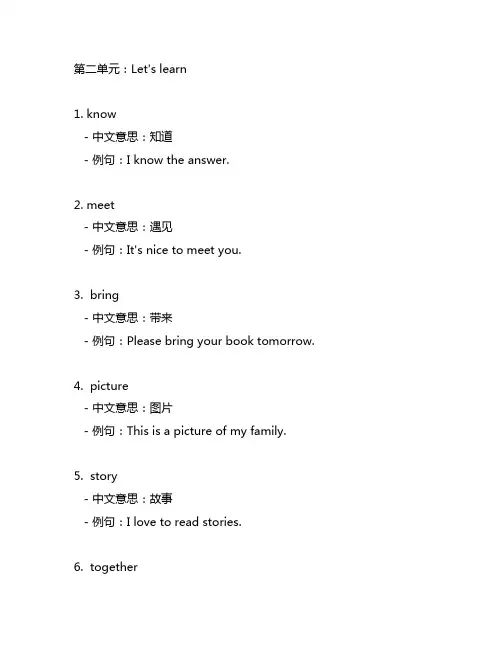
第二单元:Let's learn1. know- 中文意思:知道- 例句:I know the answer.2. meet- 中文意思:遇见- 例句:It's nice to meet you.3. bring- 中文意思:带来- 例句:Please bring your book tomorrow.4. picture- 中文意思:图片- 例句:This is a picture of my family.5. story- 中文意思:故事- 例句:I love to read stories.6. together- 中文意思:一起- 例句:Let's play together.7. also- 中文意思:也- 例句:I also like chocolate.8. love- 中文意思:喜爱- 例句:I love my pet dog.9. how- 中文意思:怎么- 例句:How are you today?10. because- 中文意思:因为- 例句:I'm happy because I got a present.第二单元主要是学习一些基础的英语单词,通过简单的词汇学习,让学生初步接触并掌握基本的日常用语。
在教学中,老师可以通过图片、故事等形式来帮助学生理解和记忆这些单词。
接下来我们将分别介绍这些单词的拼写、发音和用法。
1. know- know是一个常用动词,表示“知道”或“了解”。
在句子中常常用来表达对某个信息的掌握,比如“I know the answer.”这个句子中,“know”表示“知道”。
注意知道的用法及时态变化,同时也要让学生能清楚地发音。
2. meet- meet是动词,表示“会面”或“见面”。
在句子中可以表示在某个地方见到某人,比如“It's nice to meet you.”这个句子中,“meet”表示“见到”。
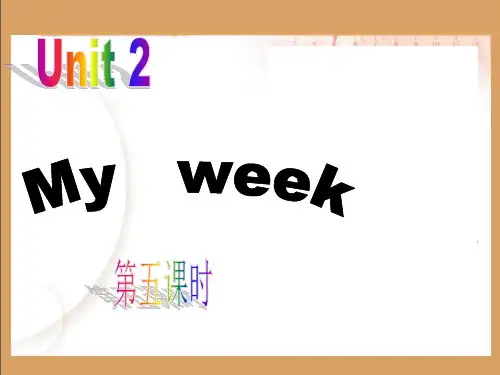
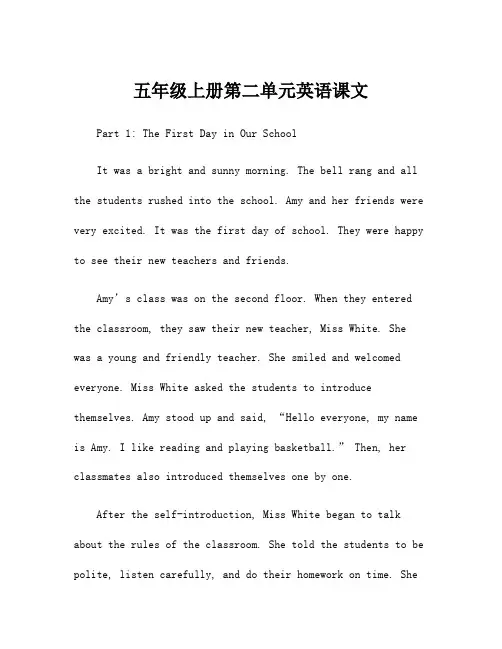
五年级上册第二单元英语课文Part 1: The First Day in Our SchoolIt was a bright and sunny morning. The bell rang and all the students rushed into the school. Amy and her friends were very excited. It was the first day of school. They were happy to see their new teachers and friends.Amy’s class was on the second floor. When they entered the classroom, they saw their new teacher, Miss White. She was a young and friendly teacher. She smiled and welcomed everyone. Miss White asked the students to introduce themselve s. Amy stood up and said, “Hello everyone, my name is Amy. I like reading and playing basketball.” Then, her classmates also introduced themselves one by one.After the self-introduction, Miss White began to talk about the rules of the classroom. She told the students to be polite, listen carefully, and do their homework on time. Shealso said, “I hope we can all work hard and learn together.” The students all nodded and promised to follow the rules.The first day in school was over quickly. Amy and her friends were happy with their new teacher and classmates.They couldn’t wait to have more fun in the coming days.Part 2: Our New ClassroomAfter the first day, Amy and her classmates began to get familiar with their new classroom. The walls were painted in light blue, and there were many colorful posters on them. On one wall, there was a big world map. On another wall, therewas a lovely picture of animals.There were twenty desks and chairs in the classroom, and each student had their own shelf for books and stationery. In the middle of the room, there was a big whiteboard for the teacher to write on.Amy and her friends were excited to see the classroom library. There were many interesting storybooks and picture books in it. They couldn’t wait to read them. The classroom was warm and cozy. They all liked it very much.In the following days, they had a lot of fun learning together in their new classroom. Amy and her friends felt happy and lucky to have such a nice place to study.。
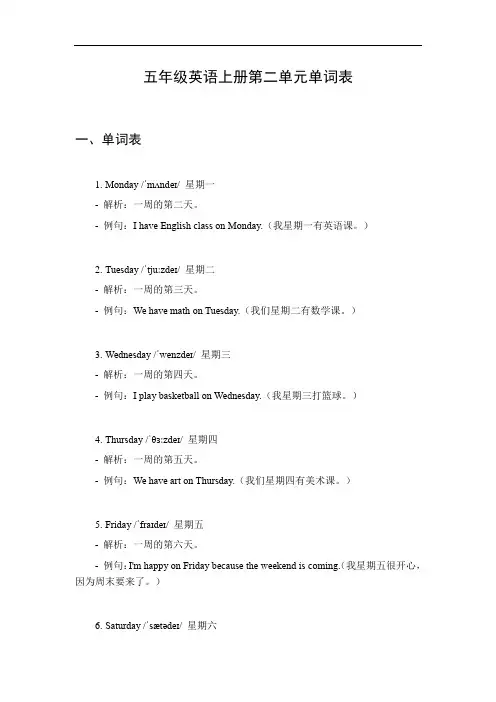
五年级英语上册第二单元单词表一、单词表1.Monday /ˈmʌndeɪ/ 星期一-解析:一周的第二天。
-例句:I have English class on Monday.(我星期一有英语课。
)2.Tuesday /ˈtjuːzdeɪ/ 星期二-解析:一周的第三天。
-例句:We have math on Tuesday.(我们星期二有数学课。
)3.Wednesday /ˈwenzdeɪ/ 星期三-解析:一周的第四天。
-例句:I play basketball on Wednesday.(我星期三打篮球。
)4.Thursday /ˈθɜːzdeɪ/ 星期四-解析:一周的第五天。
-例句:We have art on Thursday.(我们星期四有美术课。
)5.Friday /ˈfraɪdeɪ/ 星期五-解析:一周的第六天。
-例句:I'm happy on Friday because the weekend is coming.(我星期五很开心,因为周末要来了。
)6.Saturday /ˈsætədeɪ/ 星期六-解析:一周的最后一天,通常是休息日。
-例句:I go shopping on Saturday.(我星期六去购物。
)7.Sunday /ˈsʌndeɪ/ 星期日-解析:一周的第一天,也是休息日。
-例句:I watch TV on Sunday.(我星期日看电视。
)8.weekend /ˈwiːkend/ 周末-解析:Saturday 和Sunday 的统称。
-例句:I like to go hiking on the weekend.(我喜欢在周末去远足。
)9.wash /wɒʃ/ 洗-解析:清洗衣物、物品等。
-例句:I wash my clothes on Sunday.(我星期日洗衣服。
)10.watch /wɒtʃ/ 看-解析:观看电视、电影等。
-例句:I watch TV in the evening.(我晚上看电视。
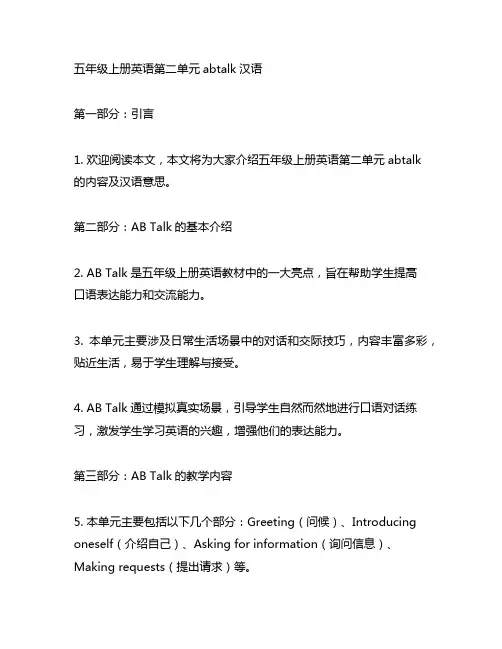
五年级上册英语第二单元abtalk汉语第一部分:引言1. 欢迎阅读本文,本文将为大家介绍五年级上册英语第二单元abtalk的内容及汉语意思。
第二部分:AB Talk的基本介绍2. AB Talk是五年级上册英语教材中的一大亮点,旨在帮助学生提高口语表达能力和交流能力。
3. 本单元主要涉及日常生活场景中的对话和交际技巧,内容丰富多彩,贴近生活,易于学生理解与接受。
4. AB Talk通过模拟真实场景,引导学生自然而然地进行口语对话练习,激发学生学习英语的兴趣,增强他们的表达能力。
第三部分:AB Talk的教学内容5. 本单元主要包括以下几个部分:Greeting(问候)、Introducing oneself(介绍自己)、Asking for information(询问信息)、Making requests(提出请求)等。
6. 学生将学会在日常交际中如何礼貌地问候他人,如何自我介绍,如何询问信息,如何提出请求等。
7. 通过这些内容的学习,学生将能够更自如地运用英语进行口语交流,提升他们的英语口语表达能力。
第四部分:AB Talk教学方法8. 在教学过程中,老师可以采用角色扮演、小组合作等方式,让学生更好地融入到对话场景中,增加学习的趣味性和交互性。
9. 老师还可以结合多媒体教学资源,展示真实的日常交际情境,帮助学生更加直观地理解和掌握对话技巧。
10. 通过多样化的教学方法,可以更好地激发学生的学习兴趣,提高他们学习英语的积极性。
第五部分:AB Talk的学习意义11. 本单元的学习不仅仅是为了学习一种语言的基本交际技能,更是为了培养学生的跨文化交际意识和能力。
12. 通过对话的练习,学生将了解不同国家的文化习俗,增强他们的跨文化交际意识,培养他们的国际化视野。
13. 通过自然而然地练习口语对话,学生的英语口语表达能力会得到进一步提升,为将来的英语学习打下坚实的基础。
第六部分:AB Talk的学习心得14. 通过学习本单元的内容,许多学生表示,他们在日常生活中已经能更加流利地进行英语口语交流。

五年级上册英语第二单元单词及知识点(经典版)编制人:__________________审核人:__________________审批人:__________________编制单位:__________________编制时间:____年____月____日序言下载提示:该文档是本店铺精心编制而成的,希望大家下载后,能够帮助大家解决实际问题。
文档下载后可定制修改,请根据实际需要进行调整和使用,谢谢!并且,本店铺为大家提供各种类型的经典范文,如工作报告、致辞讲话、条据书信、合同范本、规章制度、应急预案、心得体会、教学资料、作文大全、其他范文等等,想了解不同范文格式和写法,敬请关注!Download tips: This document is carefully compiled by this editor. I hope that after you download it, it can help you solve practical problems. The document can be customized and modified after downloading, please adjust and use it according to actual needs, thank you!Moreover, our store provides various types of classic sample essays, such as work reports, speeches, policy letters, contract templates, rules and regulations, emergency plans, insights, teaching materials, essay encyclopedias, and other sample essays. If you want to learn about different sample formats and writing methods, please pay attention!五年级上册英语第二单元单词及知识点人教版五年级上册英语第二单元单词及知识点英语最早由中世纪的英国使用。
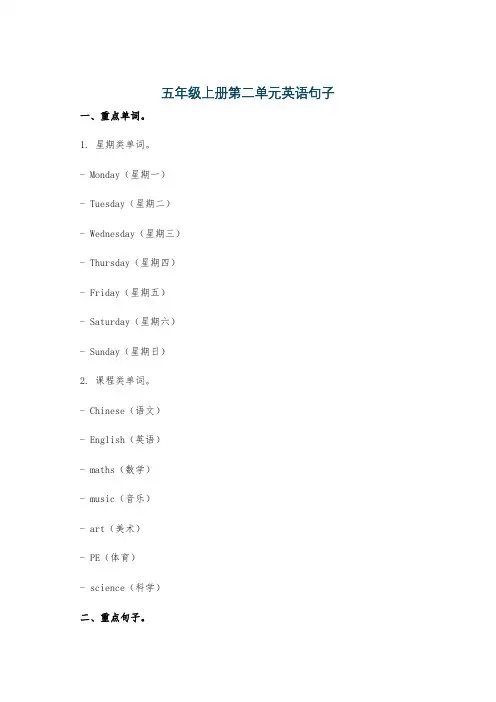
五年级上册第二单元英语句子一、重点单词。
1. 星期类单词。
- Monday(星期一)- Tuesday(星期二)- Wednesday(星期三)- Thursday(星期四)- Friday(星期五)- Saturday(星期六)- Sunday(星期日)2. 课程类单词。
- Chinese(语文)- English(英语)- maths(数学)- music(音乐)- art(美术)- PE(体育)- science(科学)二、重点句子。
1. 询问星期几有什么课。
- What do you have on Mondays?(你们星期一有什么课?)- We have English, maths and Chinese.(我们有英语、数学和语文。
)2. 表达自己喜欢的课程。
- I like English.(我喜欢英语。
)- What's your favourite class?(你最喜欢的课程是什么?)- My favourite class is music.(我最喜欢的课程是音乐。
)3. 描述课程的有趣性。
- English is fun.(英语很有趣。
)- Maths is difficult but useful.(数学很难但是很有用。
)4. 日常课程安排的问答。
- Do you have PE today?(你们今天有体育课吗?)- Yes, we do.(是的,我们有。
)- No, we don't.(不,我们没有。
)。
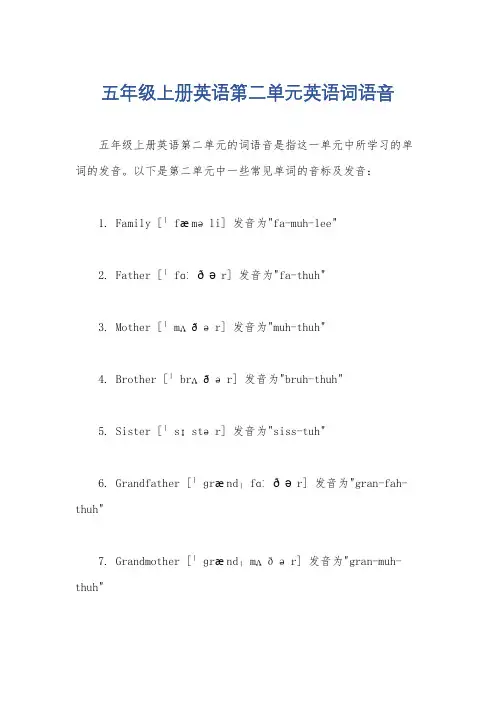
五年级上册英语第二单元英语词语音
五年级上册英语第二单元的词语音是指这一单元中所学习的单词的发音。
以下是第二单元中一些常见单词的音标及发音:
1. Family [ˈfæməli] 发音为"fa-muh-lee"
2. Father [ˈfɑːðər] 发音为"fa-thuh"
3. Mother [ˈmʌðər] 发音为"muh-thuh"
4. Brother [ˈbrʌðər] 发音为"bruh-thuh"
5. Sister [ˈsɪstər] 发音为"siss-tuh"
6. Grandfather [ˈɡrændˌfɑːðər] 发音为"gran-fah-thuh"
7. Grandmother [ˈɡrændˌmʌðər] 发音为"gran-muh-thuh"
8. Uncle [ˈʌŋkl] 发音为"uhng-kuhl"
9. Aunt [ænt] 发音为"ant"
以上是一些第二单元中常见单词的音标和发音。
希望这些能够帮助到你。
如果你还有其他问题,欢迎继续提问。
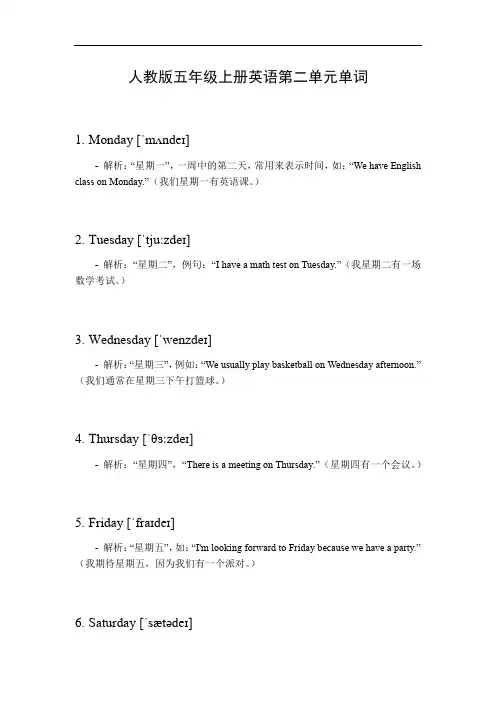
人教版五年级上册英语第二单元单词1.Monday [ˈmʌndeɪ]-解析:“星期一”,一周中的第二天,常用来表示时间,如:“We have English class on Monday.”(我们星期一有英语课。
)2.Tuesday [ˈtjuːzdeɪ]-解析:“星期二”,例句:“I have a math test on Tuesday.”(我星期二有一场数学考试。
)3.Wednesday [ˈwenzdeɪ]-解析:“星期三”,例如:“We usually play basketball on Wednesday afternoon.”(我们通常在星期三下午打篮球。
)4.Thursday [ˈθɜːzdeɪ]-解析:“星期四”,“There is a meeting on Thursday.”(星期四有一个会议。
)5.Friday [ˈfraɪdeɪ]-解析:“星期五”,如:“I'm looking forward to Friday because we have a party.”(我期待星期五,因为我们有一个派对。
)6.Saturday [ˈsætədeɪ]-解析:“星期六”,是周末的一天,“I often go shopping on Saturday.”(我经常在星期六去购物。
)7.Sunday [ˈsʌndeɪ]-解析:“星期日”,例句:“On Sunday, I usually stay at home and rest.”(在星期日,我通常待在家里休息。
)8.weekend [ˌwiːkˈend]-解析:“周末”,包括星期六和星期日,“What do you usually do on the weekend?”(你周末通常做什么?)9.wash [wɒʃ]-解析:作动词,“洗”,可用于洗衣服、洗手等,“Wash your hands before dinner.”(饭前洗手。
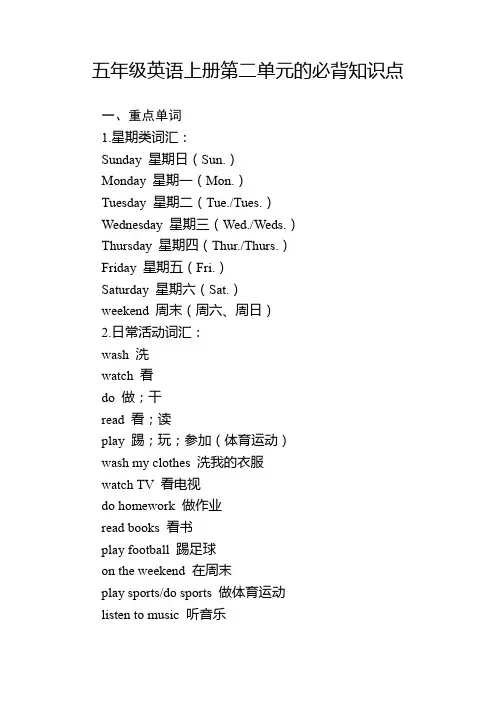
五年级英语上册第二单元的必背知识点一、重点单词1.星期类词汇:Sunday 星期日(Sun.)Monday 星期一(Mon.)Tuesday 星期二(Tue./Tues.)Wednesday 星期三(Wed./Weds.)Thursday 星期四(Thur./Thurs.)Friday 星期五(Fri.)Saturday 星期六(Sat.)weekend 周末(周六、周日)2.日常活动词汇:wash 洗watch 看do 做;干read 看;读play 踢;玩;参加(体育运动)wash my clothes 洗我的衣服watch TV 看电视do homework 做作业read books 看书play football 踢足球on the weekend 在周末play sports/do sports 做体育运动listen to music 听音乐play ping-pong 打乒乓球3.其他词汇:tired 疲倦的every 每一个,每个day 日、天have 有、吃too 太tea 茶beef 牛肉feet(foot的复数)足二、重点句型1.询问星期几及其活动:What day is it today? 今天星期几?It’s Monday. 星期一。
What do you have on Mondays? 你们星期一有什么课?We have English, maths and music. 我们有英语、数学和音乐课。
2.询问日常活动:What do you do on Thursdays? 你们星期四做什么?I often do homework and play football. 我经常做作业和踢足球。
3.一般疑问句及其回答:Do you often read books in the evening? 你晚上经常看书吗?Yes, I do. 是的,我经常看。
/ No, I don’t. 不,我不经常看。

五年级英语上册单词第二单元五年级英语上册第二单元单词
一、词汇
1. Monday [ˈmʌndeɪ] 星期一
2. Tuesday [ˈtjuːzdeɪ] 星期二
3. Wednesday [ˈwenzdeɪ] 星期三
4. Thursday [ˈθɜːzdeɪ] 星期四
5. Friday [ˈfraɪdeɪ] 星期五
6. Saturday [ˈsætədeɪ] 星期六
7. Sunday [ˈsʌndeɪ] 星期日
8. weekend [ˌwiːkˈend] 周末
9. wash [wɒʃ] 洗
10. wash my clothes 洗我的衣服
11. watch [wɒtʃ] 看
12. watch TV 看电视
13. do [duː] 做;干
14. do homework 做作业
15. read [riːd] 读;阅读
16. read books 看书
二、短语
1. on the weekend 在周末
2. play sports 进行体育运动
三、例句
1. I have Chinese on Monday. 星期一我有语文课。
2. What do you have on Tuesdays? 星期二你有什么课?
3. I often wash my clothes on the weekend. 我经常在周末洗我的衣服。
4. Do you often watch TV on Saturdays? 你经常在星期六看电视吗?
5. I do homework and read books on Sundays. 星期天我做作业和看书。
五年级上册英语第二单元单词
1. Monday(星期一)
解析:一周的第二天,通常用于表示周一开始新的一周。
2. Tuesday(星期二)
解析:一周的第三天。
3. Wednesday(星期三)
解析:一周的第四天。
4. Thursday(星期四)
解析:一周的第五天。
5. Friday(星期五)
解析:一周的第六天,很多人期待周五的到来,因为周末即将开始。
6. Saturday(星期六)
解析:一周的第七天,是周末的第一天,人们可以在这一天休息、娱乐或进行各种活动。
7. Sunday(星期日)
解析:一周的第一天,也是周末的第二天,很多家庭会在这一天一起度过。
8. weekend(周末)
解析:Saturday 和Sunday 的统称,是人们放松和休闲的时间。
9. wash my clothes(洗我的衣服)
解析:表达清洗自己的衣物的动作短语。
10. watch TV(看电视)
解析:常见的休闲活动,坐在电视机前观看各种节目。
11. do homework(做作业)
解析:学生在课后需要完成的任务。
12. read books(读书)
解析:阅读各种书籍可以增长知识和丰富想象力。
13. play football(踢足球)
解析:一项户外运动,需要用脚踢球并尝试将球踢进对方的球门。
14. play sports(进行体育运动)
解析:包括各种体育活动,如跑步、游泳、打球等,有助于保持身体健康。
人教精通版五年级上册英语第二单元第一节第一部分: 重点词汇本单元的重点词汇包括数字1-100、颜色、天气状况、季节等。
学生可以通过课堂练习、游戏和歌曲等方式来巩固这些词汇的学习。
在进行单词记忆的老师可以引导学生进行一些相关的活动,比如点读数字、玩颜色分类游戏、做季节和天气的手工等,帮助学生更好地掌握这些重点词汇。
第二节第二部分: 重点句型本单元的重点句型主要是关于询问天气状况和回答天气的表达。
学生可以通过角色扮演、问答练习、小组讨论等方式来进行句型操练,提高他们的口语表达和听力理解能力。
老师可以设计一些生动有趣的情景,比如假装成天气预报员或者新闻记者,让学生在真实的情景中运用所学句型,增强他们的语言运用能力。
第三节第三部分: 重点语法本单元的重点语法是介词in和on的用法。
老师可以通过举例、练习和应用等多种方式来帮助学生掌握这两个介词的用法,并且要让学生明白它们在句子中的作用和意义。
通过对比和案例分析,学生可以更好地理解这两个介词的用法,提高他们的语法意识和语法运用能力。
第四节第四部分: 重点教学本单元的重点教学内容包括数字、颜色、天气状况、季节、介词in和on等。
教师可以通过多媒体课件、学生练习册、课堂练习等多种途径来进行教学,让学生在不同的情景中进行学习,提高他们的学习兴趣。
教师要结合实际情境,让学生真正理解和运用所学知识,培养他们的语言交际能力和实际运用能力。
第五节第五部分: 教学方法本单元的教学方法主要包括情境教学法、交际教学法和任务型教学法等。
教师可以通过设置真实的情境、设计实际的任务,让学生在交际中学习,提高他们的语言运用能力。
老师要注重学生的参与性和动手性,让他们在教学中主动参与,增强他们的学习体验和学习效果。
第六节第六部分: 教学评估本单元的教学评估可以通过课堂练习、小组讨论、角色扮演、听力测试等方式来进行。
教师可以通过观察学生的表现、听取学生的回答、收集学生的作品等来进行评估,了解学生的学习情况,及时进行调整和反馈。
5年级英语上册第二单元一.单词思维导图Monday(second day)Friday(sixth day)Tuesday(third day)Saturday(last day)Wednesday(fourth day)星期Sunday (first day)Thursday (fifth day)week(from Monday to Friday)weekend(Saturday and Sunday)二.重要语法Part A1.There are seven days in a week.2.Sunday is the first day of a week.3.Monday is the second day of a week.4.Tuesday is the third day of a week.5.Wednesday is the fourth day of a week.6.Thursday is the fifth day if a week.7.Friday is the sixth day of a week.8.Saturday is the last day of a week最后1.Monday comes before Tuesday在···之前2.Tuesday comes after Monday在···之后3.We go to school from Monday to Friday.from···to···从···到····4.We don't go school from Saturday to Sunday.on the weekend.5.I love music.I love water.(可数复数)名词:I love water.(不可数)Love/like 宾格:I love him.动ing:I love eating.to+动原:I love to eat.三.重点单词发音ee /i:/ : see. meet. beef . bee/i:/ :sea. meat. beat. Peaea /e/: bread, breakfast/ei/: greate/i /:really四.重要句子1.Do you often read books on the weekend?2.Look at my pictures.固定搭配3.What do you have on Thursdays?上4.Who’s your music teacher?5.What do you have on Mondays?-8. What do you do on Thursdays,Grandpa?-I have a cooking class with your grandma.动词ing6.I like to read by the sea. Like to + 动原7.Feed the baby. 祈使句用动原8.Do you often read books in this park? 助动词+动原助动词动原11. Do you often play football here? 助动词+动原/ play +球类9.I like this park very much.固定搭配10.Y ou look tired.--------He looks tired.第二人称动原三单动三单11.D o you often play sports?12.I don’t like sports. 助动词+动原助动否动原13.I t’s a new school year. a+ 辅音发音/ an +(a/e/i/o/u 开头且元音发音)14.I need to do some shopping. Need to +动原15.I need a box of crayons. a box of 一盒18.What day is it today ?今天星期几?19. It's Saturday/sunny/Sunday afternoon.20. Do you often listen to music?21.What about you ?=How about you?What about/How about + 动ing22.Y ou should play sports every day. Should + 动原情态动词动原23.H ere is a new schedule for you.24.W u Binbin often watches TV on the weekend.三单主语频副三单动一般疑标志25.Wu Binbin often reads books on the weekend.三单主语频副三单动25.W u Binbin likes sports.三单主语三单动26.I27.I。
单元二单词:Unit 2 Words from English一、概述1. 本文主要阐述了人教版英语五年级上册单元二的单词内容,帮助学生更好地掌握英语单词。
2. 通过本文的阅读,读者将了解到本单元涵盖的单词范围,以及每个单词的中文意思和用法。
3. 希望本文能够为学生在学习英语单词时提供一些帮助和指导,让他们能够更快地掌握这些单词。
二、单词列表1. apple 苹果2. banana 香蕉3. cat 猫4. dog 狗5. elephant 大象6. fish 鱼7. giraffe 长颈鹿8. hat 帽子9. igloo 冰屋10. juice 果汁三、单词解释1. apple 苹果:指一种常见的水果,通常呈现为红色或绿色。
2. banana 香蕉:指一种呈现黄色的水果,通常味甜,皮易剥。
3. cat 猫:指一种常见的宠物动物,很多人都喜欢养猫。
4. dog 狗:指一种忠诚的宠物动物,常常被人类用作看家护院的伙伴。
5. elephant 大象:指一种体型庞大的动物,通常生活在非洲和亚洲的热带地区。
6. fish 鱼:指一种生活在水中的动物,通常被人类作为食物。
7. giraffe 长颈鹿:指一种有着非常长脖子的动物,通常生活在非洲的草原上。
8. hat 帽子:指一种用来遮阳或保暖的头部穿戴物,常见于各种服饰中。
9. igloo 冰屋:指一种由冰块堆砌而成的居住建筑,常见于极地地区。
10. juice 果汁:指由水果榨取而成的饮料,口味多样,营养丰富。
四、单词用法1. 在句子中,apple 可以用来表示“我喜欢吃苹果”:I like to eat an apple.2. 在句子中,banana 可以用来表示“你喜欢吃香蕉吗?”:Do you like to eat banana?3. 在句子中,cat 可以用来表示“这只猫很可爱”:This cat is very cute.4. 在句子中,dog 可以用来表示“我喜欢养小狗”:I like to keepa dog.5. 在句子中,elephant 可以用来表示“大象是非常大的动物”:Elephant is a very big animal.6. 在句子中,fish 可以用来表示“我经常去河边钓鱼”:I oftengo fishing by the river.7. 在句子中,giraffe 可以用来表示“长颈鹿有着非常长的脖子”:A giraffe has a very long neck.8. 在句子中,hat 可以用来表示“我喜欢戴一顶帽子”:I like to wear a hat.9. 在句子中,igloo 可以用来表示“在阿拉斯加,有很多人住在冰屋里”:Many people live in igloos in Alaska.10. 在句子中,juice 可以用来表示“你想来一杯橙汁吗?”:Do you want a glass of orange juice?五、结语1. 通过本文的阅读,相信读者对人教版英语五年级上册单元二的单词内容已经有了一定的了解。
英语五年级上册第二单元知识点
以下是英语五年级上册第二单元的知识点:
1. 词汇:学生需要掌握一些与学校生活相关的词汇,例如“classroom”,“teacher”,“student”,“blackboard”,“book”等。
2. 句型:学生需要掌握一些简单的疑问句和陈述句,例如“Is this your classroom?”,“Yes,it is.”,“This is my classroom.”,“That is your blackboard.”,“How many students are there in your class?”,“There are 30 students in my class.”等。
3. 语法:学生需要了解一些基本的语法知识,例如人称代词和物主代词的用法,可数名词和不可数名词的区分,以及简单句子的结构等。
4. 日常用语:学生需要能够运用所学知识进行简单的日常交流,例如自我介绍、询问物品的归属、表达班级人数等。
总之,这个单元的主要目的是让学生了解一些基础英语知识,培养他们的语言表达能力,为他们以后的学习打下坚实的基础。
希望这些信息能帮助您更好地了解这一单元的学习内容。